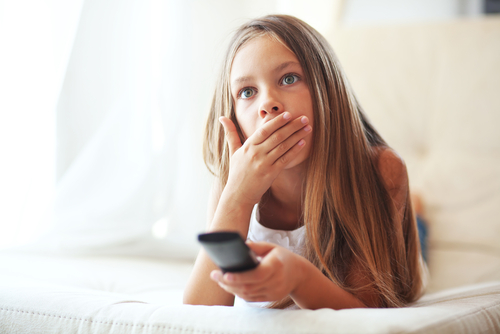How to help kids deal with worrying news stories
We’re constantly shown violence in the news
We’re a 24 hour news society with an endless stream of information filtering into our homes whether we want it or not. So when violent attacks, terrorist incidents or war situations occur and get reported on news channels it can be hard to protect our children from hearing all the gruesome details. Many parents quite literally, feel ‘lost for words’ in these situations – what should we be saying to our children in order to help alleviate their anxiety?
Anxiety levels are at an all time high
Anxiety levels amongst children are rising and ironically, it’s one of the biggest worries for parents today. Left unchecked, children can grow ‘into’ their fears, rather than grow out of them with harsh and long-term consequences. It can set back their emotional growth and hamper performance in every area of their lives. Anxiety will stop your child from making friends, taking part in social activities, sitting exams successfully and fulfilling their potential.
Fear is a natural and essential human emotion: after all, being programmed with the ability to have feelings of fear is what saved our ancestors from being eaten by sabre-toothed tigers. But there aren’t too many sabre-toothed tigers for us to deal with nowadays and most of the things that we worry about never happen. We can end up feeling stressed for no particular reason. But, feelings of fear and anxiety are just that: feelings. And the good thing about feelings is that they can be changed.
Top tips for soothing anxiety
1) “Will this happen to me?”
is the first thought that will be running through your child’s mind. They’ll be wondering how this will impact on their own safety. Having seen incidents on the TV, your child will start wondering whether this is going to start happening in the street right outside their home. This will be especially true if your child has seen other children in danger for they’ll be able to relate to them more. Reassure your child that this is happening ‘far, far away’. Distance can be hard for children to imagine, so get a map or globe and point out that it’s no where near their home or school.
2) Give plenty of time
Spend extra time sitting with your child especially at bedtime and listen carefully to their concerns. Every child is different and depending on their age and temperament will have a different perspective on the news stories. It’s possible to worry your child even more by giving too much information in your conversations, so try to learn what ‘specifically’ it is that is worrying your child. It may not be as bad as you think and a simple answer may be all that’s required.
3) Empathise
Use phrases such as: “I can see that you’re feeling worried / scared / anxious and that’s understandable. It’s a horrible thing that has happened”.
4) Avoid using negative phrases such as:
– Don’t worry
– Just stop thinking about it
– Don’t keep going on about it or you’ll make it worse.
– Stop talking about it because you’re starting to scare your little brother! (Say this and don’t be surprised if ‘little brother’ starts crying.)
Our minds make pictures or images out of the words that we think or hear. Using a negative word will mean your child will end up doing exactly what you don’t want them to do – worry!
5) Reassure your child that we’re safe
Tell your child that when horrible things happen, there are lots of people who are looking after us and will keep us safe – eg. Government, Police, teachers, Mums and Dads. They’ll make sure that this doesn’t happen to us and they also find the bad people and put them into prison.
Always use words that reflect the desired state, such as:
– It’s OK, we’re all safe.
– We can stay calm about this, because it’s happening far, far away.
– We can relax now, because there are plenty of people taking care of this for us.
– The situation is over now – it’s finished.
6) Use the analogy of a false alarm to explain anxiety
Liken your child’s feelings of anxiety to a smoke alarm going off when it’s got a bit too smoky in the kitchen from the cooking. The smoke alarm can’t tell the difference between a bit of smoke and a real fire – so it’s a ‘false alarm’. And sometimes when our bodies feel a bit panicky and anxious, the same kind of thing is happening. Our bodies make a bit of a ‘mistake’ and worry us for no reason – there is no real danger.
7) Extra fresh air and exercise
Watching and hearing bad news stories will increase the production of adrenaline and cortisol in the body. Ensure your child has plenty of outlets for burning these stress chemicals off. Increase the amount of exercise they take right now, preferably in the open air, otherwise their stress levels will simply keep on elevating.
8) Laughter soothes stress
Laughter is another way of changing the brain’s chemistry quickly. Watch more comedy and funny movies on TV and introduce a ‘good news’ only rule in conversations around the dinner table. Too often it’s easy to fall into the trap of sharing bad news: ‘I missed the bus this morning / got caught in the rain / got pushed over in the playground’. And if you’re short of conversation, keep a joke book to hand and get the kids to read jokes out to the family over dinner. It’s time to switch off the TV and start playing more family games such as Monopoly or Twister. Also soothing will be gentle activities such as colouring books that are now enjoying a resurgence in popularity amongst many adults. This is the time to avoid playing competitive computer games, no matter how much fun they may be, for they’ll be adding to the stress chemical overload in the body if they’re not properly burnt off.
9) Food & Anxiety
Be aware that certain foods will alter your child’s stress and anxiety levels as well as create mood swings. Now is the time to avoid the stimulating effects of sugar and caffeine in fizzy and energy drinks that will cause fluctuations in blood sugar levels. This includes natural sugars found in fruit juices and smoothies. It may be tempting to make the world seem ‘a happy place’ by introducing more chocolate, sweets and cake, but you’ll be adding to your child’s ‘wobbly’ feelings right now. Introduce more protein into the diet to help steady your child’s nerves and make them feel more grounded. Good foods to eat plenty of are: wholegrain breads rather than white, fish, turkey, chicken, cottage cheese, pulses and fruit and vegetables in general. If your child can eat nuts safely, it’s a good idea to keep some handy for snacks in between meals.
10) Breathe
Anxiety can lead to a shortness of breath. This leads to a pale complexion, sweaty hands and face, tightness in the chest and even giddiness or fainting. “Take a nice deep breath” is a traditional response and is a phrase we’re all familiar with, but taking a nice, deep breath inwards is precisely what an anxious person doesn’t need to do. Anxious feelings can be caused by having too much ‘breath’ trapped in the lungs, which gives that sensation of not being able to breathe. Your child will feel better if you ask them to ‘blow out’ instead – the air will be expelled out of their lungs and they will automatically relax and get back into an easy rhythm of breathing.
Toys that will help:
– a hand-held windmill toy with sails that needing blowing
– container of bubble mixture to blow through a wand
– blowing balloons
– blowing bubbles through a straw
or ask your child to scrunch up their hand and simply imagine that they’re blowing up a balloon or bag. Long, slow breaths is what’s required and this technique in particular, is useful in an emergency if a panic attack strikes.
About the Author
Alicia Eaton is a Harley Street based Psychotherapist and Clinical Hypnotherapist and the author of four best-selling books. She’s also a Winner in the latest ‘Global Health & Pharma’ Mental Health Awards 2023. For more details of appointments see here: Consultations.
For more on the topic of children’s anxiety, take a look at my books, ‘Words that Work – How to Get Kids to Do Almost Anything’ and ‘First Aid for Your Child’s Mind’.


